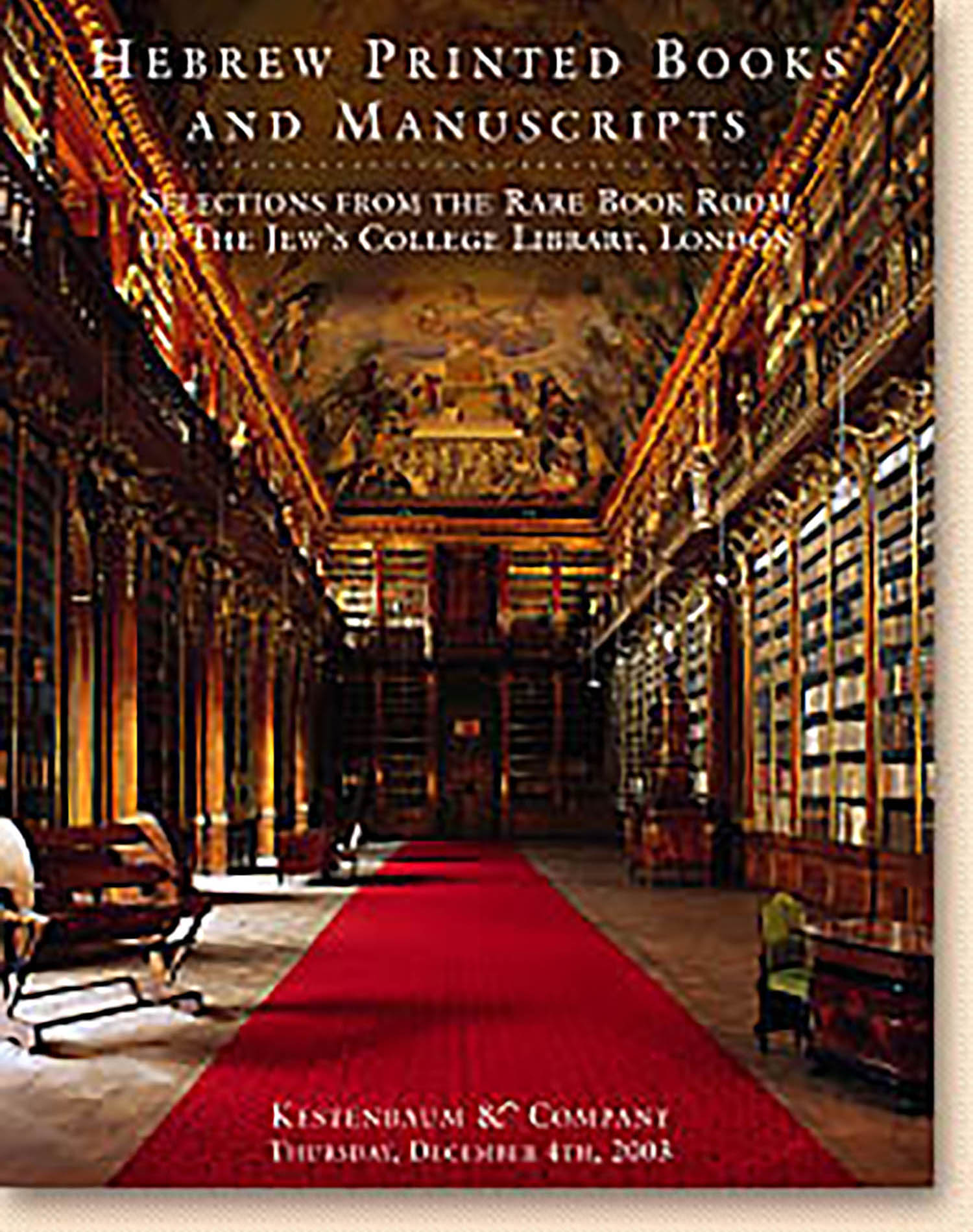Midrash Shmuel [MIdrash to the Book of Samuel]. Constantinople, 1517 • Bound together with: Ibn Shuaib, Joshua. Derashoth Ibn Shuaib [Sermons on the Pentateuch]. (Constantinople: Shelomo ben Mazal Tov, 1523).

AUCTION 21 |
Thursday, December 04th,
2003 at 1:00
Kestenbaum & Company Holds Inaugural Auction of Hebrew Printed Books & Manuscripts at Their New Galleries
Lot 104
Ibn Shu’a’ib, Joshua
Midrash Shmuel [MIdrash to the Book of Samuel]. Constantinople, 1517 • Bound together with: Ibn Shuaib, Joshua. Derashoth Ibn Shuaib [Sermons on the Pentateuch]. (Constantinople: Shelomo ben Mazal Tov, 1523).
Est: $10,000 - $15,000
PRICE REALIZED $18,000
BOTH WORKS ARE EXCESSIVELY RARE - ESPECIALLY IBN SHUAIB
The last two leaves of Midrash Shmuel contain the Responses of Sa’adyah Gaon to Ten Questions Concerning the Resurrection of the Dead.
Biographical details of R. Joshua ibn Shuaib are rather scant. He lived in Spain (either Navarra or Tudela) in the first half of the 14th century and was a disciple of Rabbi Solomon ben Adret (RaSHB”A). The sermons of Ibn Shuaib are unique inasmuch as they are the only collection of sermons by a Rishon (medieval authority) that span the entire Pentateuch and cycle of the year. Hitherto, RABa”D and Nachmanides’ sermons were restricted to the single festival of Rosh Hashanah. Ibn Shuaib’s sermons exhibit an abiding interest in the Kabbalah and a fondness for Nachmanides, whom he often quotes. (Some go so far as to speculate that Meir ibn Sahula’s supercommentary to Nachmanides’ commentary on the Pentateuch was purloined from Ibn Shuaib.) The Derashoth of Ibn Shuaib are an invaluable source of midrashim that have not come down to us through other sources. EJ, Vol. VIII, cols. 1201-1202.
In 1969, a photocopy edition of the Cracow 1575 edition was published in Jerusalem with a scholarly introduction by Prof. Shraga Abramson. The later Cracow edition is inferior due to printer’s oversights, it lacks text found in the editio princeps. In 1992, R. Ze’ev Metzger of Jerusalem published an annotated edition based on the Constantinople 1517 edition. In his introduction, Metzger shows several parallels between Ibn Shuaib and the works of R. Yom Tov ben Abraham (RITB”A) of Seville, another disciple of R. Solomon ben Adret. Prof. Carmi Horowitz wrote his doctoral dissertation at Harvard University on the importance of this work in various areas, including rabbinic culture and Jewish society in 14th century Spain. See C. Horowitz, The Jewish Sermon in 14th Century Spain: The Derashot of R. Joshua Ibn Shu’eib (Cambridge, MA: Harvard University Press, 1989).
The censor Camillo Jagel, as his Hebrew surname indicates, was an apostate Jew. A facsimile of his signature may be found in William Popper, The Censorship of Hebrew Books (New York, 1969), between pages 136-137, no. 2. There is some debate whther the Church censor Camillo Jagel and the Jewish savant Abraham Yagel are one and the same. See David B. Ruderman, Kabbalah, Magic, and Science: The Cultural Universe of a Sixteenth-Century Jewish Physician (Cambridge, MA, 1988), pp. 165-168, Appendix: “Did Abraham Yagel Convert to Christianity?" Ruderman’s conclusion is that Camillo Jagel and Abraham Yagel could not possibly be the same person.
